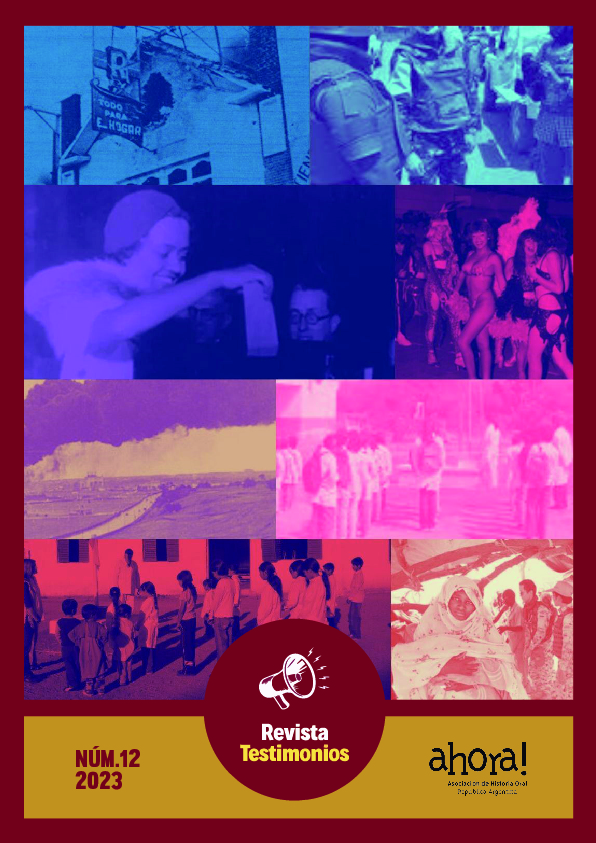The silence of narrating
Keywords:
Silence, Suffrage, Oral history, Women, InterviewAbstract
Telling, narrating, speaking, remembering... words that are part of the vocabulary of researchers who work with the Oral History methodology. This article is about the use of this methodology and the experiences we have had so far. The result of post-doctoral research that is underway in the Postgraduate Program in History, at the State University of Montes Claros/MG, Brazil, whose theme deals with women's suffrage, we sought in this specific writing to discuss the silence/ silence faced to date, by proposing interviews with the 4 councilors and a former deputy mayor of the city of Montes Claros. These attempts have mobilized our attention and our efforts, since it is extremely important at this stage of the research to listen to the women who currently hold council positions in the city. However, silence has become the keynote of the research and efforts to contact some and even the return of interviews already carried out with others are not having any effect. Therefore, in this writing, we seek to debate and analyze what has mobilized this silence/silencing, seeking to understand what motivates it, in addition to seeking to understand whether there is a possible relationship between voting, feminism and silence in the city of Montesclaro.
References
Alberti, Verena. 2006. História Dentro da História. En: Pinsky, Carla B. Fontes Históricas, Contexto, São Paulo.
Beavouir, Simone de. 1967. O Segundo Sexo, Difusão Europeia de Livros, São Paulo.
Biroli, Flávia. 2018. Gênero e desigualdade: os limites da democracia no Brasil. – 1.ed. Boitempo, São Paulo.
Candau, Joël. 2021. Memória e identidade: do indivíduo às retóricas holistas. En: Memória e identidade. São Paulo.
Didi-Huberman. Georges. 2015. Que emoção! Que emoção? Lisboa.
Foucault, Michel. 2013. A ordem do discurso: aula inaugural no Collége de France, pronunciada em 2 de dezembro de 1970. 23 ed.- Ediçoes Loyola, São Paulo.
Halbwachs, Maurice. 1990. A Memória coletiva. Trad. de Laurent Léon Schaffter. São Paulo.
Harner, June Edith. 2003. Emancipação do sexo feminino: a luta pelos direitos das mulheres no Brasil. 1850-1940. June E. Hahner; tradução de Eliane Lisboa; apresentação de Joana Maria Pedro. Florianópolis: Ed. Mulheres; Santa Cruz do Sul: EDUNISC.
Nascimento, Maria De Fatima Gomes. 2004. Tiburtina de Andrade Alves: entre as relações de poder e as representações sociais de uma mulher (montes claros na primeira metade do século xx). Dissertação, Universidade de Vassouras, Fusve.
Nora, Pierre. 1993. Entre memória e história: a problemática dos lugares. Projeto História, São Paulo, n.10, dez. 1993, p.7-28.
Paula, Hermes Augusto de. 2007. Montes Claros, sua história, sua gente e seus costumes. Volumes 1, 2 e 3. En: Leite, Marta Verônica Vasconcelos. Coleção Sesquicentenária, Editora Unimontes, Montes Claros.
Pedro, Joana Maria. 2011. “Relações de Gênero como categoria transversal na historiografia contemporânea”. Topoi, v. 12, n.22, jan-jun. 2011, p. 270-283.
Perrot, Michele. 1989. “Práticas da memória feminina”. Revista Brasileira de História. Vol. 9, n.18, p. 9-18.
Pollak, Michael. 1989. “Memória, esquecimento, silêncio”. Revista Estudos Históricos, v. 2, n. 3, p. 3-15.
Rodrigues, Rejane Meireles Amaral Rodrigues. 2013. Memórias em Disputa: transformando modos de vida no sertão e na cidade. Jundiaí: Paco Editorial.
Rosenwein, Barbara H. 2011. História das Emoções: problemas e métodos. Tradução de Ricardo Santhiago. São Paulo.
Silveira, Ivone & Colares, Zezé. 1999. Montes Claros de ontem e de hoje. Gráfica Giordani Editora: Montes Claros.
Downloads
Published
Issue
Section
License

This work is licensed under a Creative Commons Attribution-NonCommercial-ShareAlike 4.0 International License.
No se permite un uso comercial de la obra original ni de las posibles obras derivadas, la distribución de las cuales se debe hacer con una licencia igual a la que regula la obra original.













